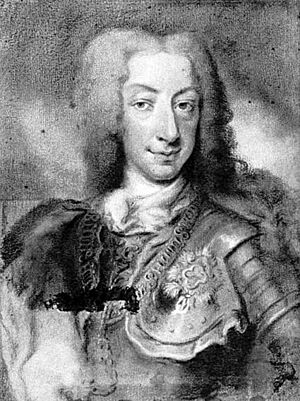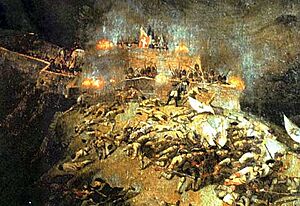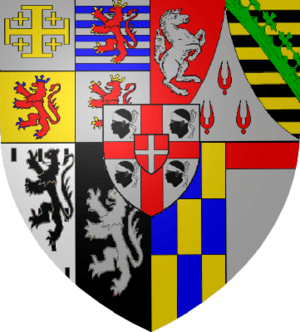Charles Emmanuel III of Sardinia facts for kids
Quick facts for kids Charles Emmanuel III |
|
|---|---|
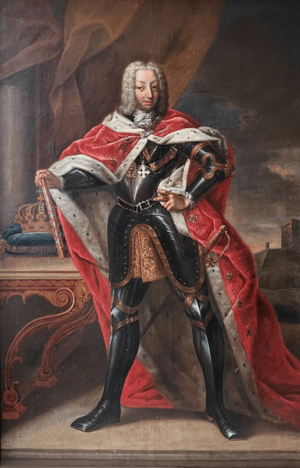 |
|
| King of Sardinia and Duke of Savoy | |
| Reign | 3 September 1730 – 20 February 1773 |
| Predecessor | Victor Amadeus II |
| Successor | Victor Amadeus III |
| Born | 27 April 1701 Turin, Savoy |
| Died | 20 February 1773 (aged 71) Turin, Savoy |
| Burial | Basilica of Superga |
| Spouse |
|
| Issue Detail |
Prince Vittorio Amedeo Victor Amadeus III Princess Eleonora Maria Princess Maria Luisa Princess Maria Felicita Prince Emanuele Filiberto Carlo, Duke of Aosta Princess Maria Vittoria Prince Benedetto, Duke of Chablais |
| House | Savoy |
| Father | Victor Amadeus II of Sardinia |
| Mother | Anne Marie d'Orléans |
| Religion | Roman Catholicism |
Charles Emmanuel III (born April 27, 1701 – died February 20, 1773) was the Duke of Savoy and King of Sardinia. He ruled from 1730 until his death. He was known for his military skills and for improving his kingdom.
Contents
Becoming King of Sardinia
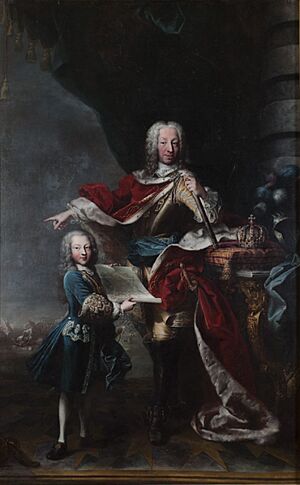
Charles Emmanuel was born in Turin, Italy. His parents were Victor Amadeus II of Savoy and Anne Marie d'Orléans. His mother was French, and her grandparents included Charles I of England. Charles Emmanuel had an older brother who was supposed to be king. But his brother died in 1715, making Charles Emmanuel the next in line.
In 1713, after a big war, his father became the King of Sicily. However, in 1720, he had to trade Sicily for the Kingdom of Sardinia. This made the family rulers of Sardinia.
In 1730, Charles Emmanuel's father, Victor Amadeus II, decided to give up his throne. Charles Emmanuel then became King Charles Emmanuel III. His father had not spent much time teaching him, except about military matters.
After a while, his father tried to take back the throne. He said Charles Emmanuel was not a good ruler. But Charles Emmanuel stopped him and kept his position as king. His father was then kept in a castle until he died.
Wars and New Lands
Charles Emmanuel was a strong military leader. He led his armies in several important wars.
The War of Polish Succession
In the War of the Polish Succession, Charles Emmanuel joined forces with France. In 1733, his army marched into Lombardy (a region in Italy) and took control without many problems. France wanted to give some of the captured lands to Spain. Charles Emmanuel did not like this idea because he did not want Spain to become too powerful in Italy again.
His army won two battles, but in the end, he had to leave Lombardy. However, he gained some new areas for his kingdom, including Langhe, Tortona, and Novara.
The War of the Austrian Succession
Charles Emmanuel also fought in the War of the Austrian Succession. He supported Maria Theresa of Austria and received help from Great Britain and the Dutch Republic. He faced French and Spanish armies that invaded his lands.
In 1744, he personally defended the city of Cuneo from attackers. The next year, his army of 20,000 faced two enemy armies with 60,000 soldiers. Some of his important forts fell. But in 1746, with help from Austria, he took back some of his lands.
In 1747, he won a huge victory against the French at the Battle of Assietta. This battle saved his territories. The war ended with the Treaty of Aix-la-Chapelle. Charles Emmanuel was a good negotiator. He got back the lands he had lost, like Nice and Savoy. He also gained new areas, including Vigevano.
After these wars, he decided not to join the Seven Years' War (1756–1763). Instead, he focused on making his kingdom better. He improved his army and strengthened his forts. He also reopened the Universities of Sassari and Cagliari to help the people of Sardinia.
Charles Emmanuel III died in Turin in 1773 and was buried in the Basilica of Superga.
Art Collector
Charles Emmanuel III loved art, just like his family before him. He added many new paintings to the collection he inherited. He also received paintings from his relative, Prince Eugene of Savoy, who had no children. This collection included many works by artists from Flanders and the Netherlands.
Because of his efforts, the Sabauda Gallery in Turin became the largest collection in Italy of 16th and 17th-century Flemish and Dutch paintings. In 1731, he even started a workshop in Turin to make tapestries. He had a special painter, Jan Peeter Verdussen, who painted many of his military victories.
Family Life
Charles Emmanuel married three times, but all his wives died young.
His first wife was Countess Palatine Anne Christine of Sulzbach. They married in 1722. She died in 1723, a few days after giving birth to their son:
- Prince Vittorio Amedeo Theodore of Savoy (1723–1725), who died as a baby.
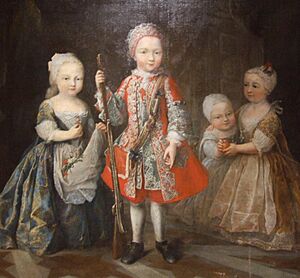
His second wife was Princess Polyxena of Hesse-Rheinfels-Rotenburg. They married in 1724. She died in 1735. They had six children:
- Victor Amadeus III of Sardinia (1726–1796), who became king after his father.
- Princess Eleonora Maria Teresa of Savoy (1728–1781).
- Princess Maria Luisa Gabriella of Savoy (1729–1767), who became a nun.
- Princess Maria Felicita of Savoy (1730–1801).
- Prince Emanuele Filiberto of Savoy, Duke of Aosta (1731–1735), who died as a baby.
- Prince Carlo Francesco Romualdo of Savoy, Duke of Chablais (1733–1733), who died as a baby.
His third wife was Princess Elisabeth Thérèse of Lorraine. They married in 1737. She died in 1741. She was the younger sister of Francis I, Holy Roman Emperor. They had three children:
- Prince Carlo Francesco of Savoy, Duke of Aosta (1738–1745), who died as a child.
- Princess Maria Vittoria Margherita of Savoy (1740–1742), who died as a baby.
- Prince Benedetto of Savoy (1741–1808), Duke of Chablais.
See also
 In Spanish: Carlos Manuel III de Cerdeña para niños
In Spanish: Carlos Manuel III de Cerdeña para niños
 | Janet Taylor Pickett |
 | Synthia Saint James |
 | Howardena Pindell |
 | Faith Ringgold |


